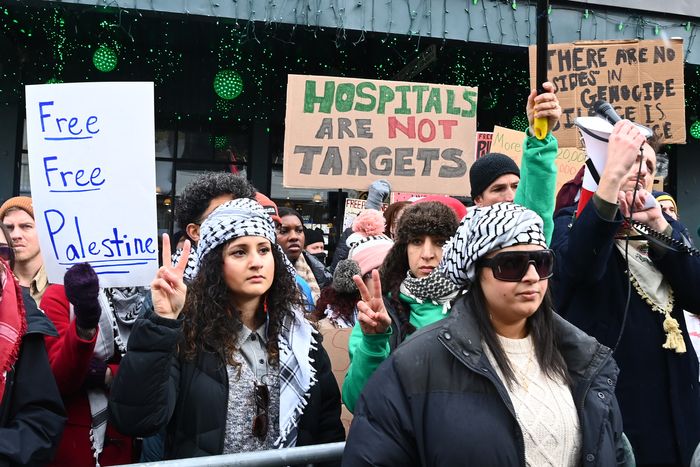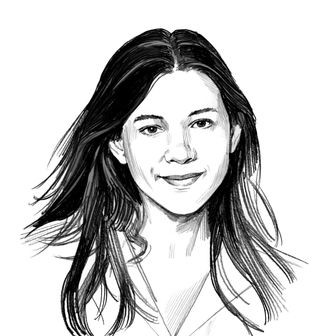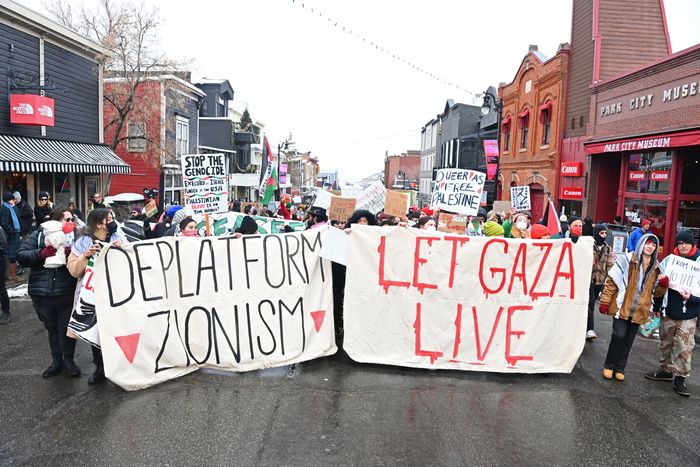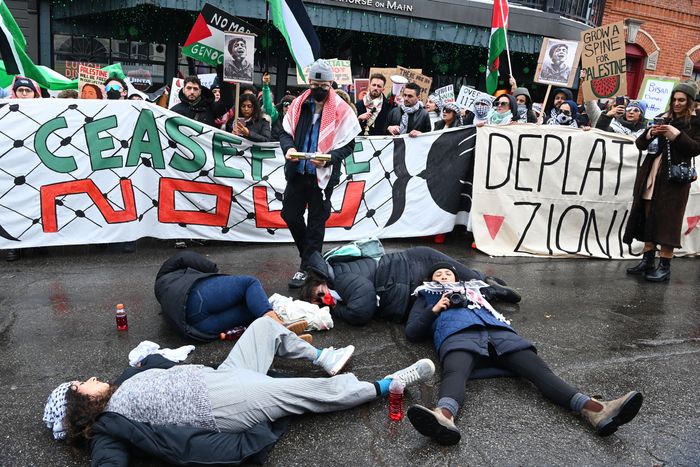
Early Sunday afternoon at the Sundance Film Festival, dozens of protesters gathered at the base of the Park City bus loop, passing around keffiyehs and handmade signs with painted watermelons and slogans like “Grow a spine for Palestine.” They made their way past the DoorDash brand activation and Napoleon Dynamite 20th-anniversary food truck over to Main Street, and soon the dozens grew to more than a hundred, calling for a ceasefire in Gaza. For years, the Sundance Institute’s messaging has focused on “uplifting global independent voices,” and on the festival’s landmark 40th anniversary, there is ample programming meant to align Sundance’s identity as a festival with activism and social justice.
But this year, there has been mostly silence on the ground about human-rights crises that directly affect the artistic communities at the core of Sundance. On Friday, January 19, just one day into the festival, the Utah House of Representatives passed HB257, one of the most dangerous, overreaching trans “bathroom bills” in the country. A mere 45-minute drive up the mountain from the State Capitol, meanwhile, some of Sundance’s biggest films of the year were by trans directors and about trans subjects. On January 25, the bill passed in the Senate. Sundance has yet to release an official statement.
Another matter of silence from festival officials is Israel’s ongoing bombardment of Gazan civilians and infrastructure following the Hamas attacks of October 7. Festival organizers have been quiet on Israel and Gaza in official statements, events, and panels; with rare exceptions, artists haven’t brought it up in speeches or on press lines — a trend this awards season, too. I heard from a colleague that at a Q&A following a screening of Reality Winner biopic Winner, an audience member asked a question that tied the political story of the film into calls for a ceasefire and was greeted with boos from the crowd. The moderator quickly pivoted away from the topic. This year also sees no official feature entries into the festival from Israel or Palestine. The overall atmosphere of silence prompted over 700 people in the industry to sign a Film Workers for Palestine letter, released around the start of the festival, calling for “an end to genocide, apartheid, and repression, stating:
“We recognize the calls made by the Palestine Film Institute to hold international film festivals accountable, and in this moment of urgency we echo their call for filmmakers to use their platforms during Q&As, talks, and panels to read statements highlighting the Palestinian struggle. In spaces where safety and solidarity are lacking, we will create and ensure it.”
So daily vigils have been held on Main Street in the mornings, and a protest was planned by organizers over WhatsApp. At the protest, I spoke with a white-haired Park City resident who told me that she was meeting a Palestinian friend and was protesting because she doesn’t want to see the United States government funding weapons. “The thing about the media is, it’s been a hundred days, so they figure, we can move on to something else.” Melissa Barrera, who is at the festival for Your Monster and who has been an outspoken supporter of human rights in Gaza, accepted a keffiyeh from an organizer who thanked her for her support, and she was soon joined by Ponyboi’s Indya Moore, who livestreamed the event to her followers and took the megaphone to deliver a speech emphasizing the common cause: “The Semitic diaspora will find liberation through the freedom of the Palestinian people … This is not a Jews-versus-Palestinians issue, this is about everybody getting free from violence … We are asking, we are begging, we are demanding [ceasefire] with our lives, our careers, with our souls, that this ends. Because if it doesn’t end, it will continue to destroy the planet. All of these issues are interconnected.”
Other protesters shared messages in their own speeches expressing the link between film workers and the Palestinian cause, saying, “The people of Palestine are using art as resistance — they’re making movies, they’re livestreaming their genocide.” Two passing bros booed, and soon around five or six counter-protesters gathered across the street, including “leader in pro-Israel activism” Noa Tishby, who had spoken earlier in the day at a panel at noon called “Sects, Lies and Videotape: Debunking deadly tropes about Jews and Israel in TV, film, and media,” presented by a group called Jew in the City. They brought out a sound system to play “Hatikvah” and waved an Israeli flag, with one woman motioning to the crowd and yelling, “Look at all of these people in support of October 7!” In response to chants for “ceasefire now,” the counter-protesters chanted, “Bring them home / ceasefire tomorrow.”
I recognized a few of the counter-demonstrators from a private and unofficial Sundance event held two days earlier at a CrossFit gym. It had advertised the opportunity to “meet survivors, freed hostages, families of those still in captivity, and other notable guests, in a one-of-a-kind gathering” and featured a large mural (photo op? Step and repeat?) that said “Bring Them Home.” The event was being held by a variety of Zionist groups, including Taglit Birthright Israel and various pro-Israel on-campus initiatives dedicated to quashing criticism of Israel on American college campuses. There were no “freed hostages” in attendance, but a survivor of the October 7 massacre at the Nova Music Festival was there, as was the parent of a hostage (an American who moved to Israel and volunteered to join the army as a lieutenant commander operating tanks). He shared that he and other American parents of hostages had met with President Biden for two hours, and that the president showed them “his Zionistic, real passion for Israel.” That parent had also flown out to meet with the president of Qatar, and his stories about access to world leaders contrasted vividly with stories of Gaza’s thwarted communication efforts, from blackouts to journalist deaths. “We’re at fucking Sundance … We’re going to get through this!” an emcee declared.
At the Sunday protest, I asked Alkhateeb why organizers felt the need to organize this demonstration at Sundance, specifically. “Art is a way of communicating through culture … and since we’re not seeing that, since we’re not seeing [many artists] actually get involved with the issue, we have to call them out … We’re telling them, ‘We’re watching you.’”
Four activists laid down in front of a ceasefire banner, posing as dead Palestinians, and a counter-protester heckled, “This is bad acting, you’re at Sundance!” As the protest continued marching en masse further up Main Street, I caught up with I Saw the TV Glow star Brigitte Lundy-Paine in the crowd. “I think that Sundance is complicit in the genocide, through its sponsorships, advertising the funders of war,” they said. “The fucking Chase Sapphire Lounge, let’s burn it down. Let’s smash the windows. Stop Cop City. They’re enabling the Zionist panel. Shut it down. Sundance: What do you have to say for yourself?”
The demonstration ended peacefully, and as the police eventually opened Main Street back up to cars, I saw a man in a keffiyeh sharing his umbrella with a woman from the pro-Israel side of the street, having a conversation; I watched them exchange numbers. The protest didn’t disrupt any festival programming, but it was covered by the news, and it in some ways broke the silence that had been hanging over the past few days in Park City. That night, documentarians Brett Story and Stephen Maing gave a speech expressing grief for the victims of ongoing violence in Gaza and loss of human life on both sides of the border wall at the premiere of their film Union. Story spoke about how being raised in the West Bank taught her the skills that helped her become a filmmaker. Elsewhere that same night, Bangladeshi-American filmmaker Farihah Zaman quoted the Film Workers for Palestine letter on a panel at the festival’s Muslim House. And on Monday, documentarian Jules Rosskam called for a permanent ceasefire at the premiere of their film, Desire Lines, hoping that the audience can hold space for the land’s “histories and potentials … so that we may make more liberated futures together.”
Ultimately, though, the two sides at the festival seem to remain entrenched in their differences. Speaking with Variety, Tishby said protesters at the festival were supporting “a jihadi genocidal organization that is fully committed to your annihilation.”
One publicist at the festival told me anonymously that the prevailing atmosphere of silence by the majority of people speaking at the festival had them disillusioned about not just Sundance, but the industry entirely. “I always wanted to work in film,” they said. “Now I think I’ll go to grad school.” Over 1,500 film workers have since signed the Film Workers for Palestine letter since it was released last week.
Correction: According to organizers, the number of Film Workers for Palestine letter signatories was over 7,000 at the time of publication.
More From Sundance 2024
- Presence Is the Best Thing Steven Soderbergh’s Done in Ages
- Kieran Culkin Is a Mercurial Pleasure in A Real Pain
- The Outrun Shows Us Saoirse Ronan at Her Most Transcendent




